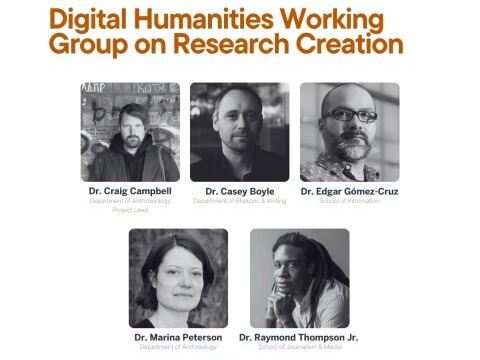2024-25 Digital Humanities Research Working Groups
2025 | Digital Humanities (DH) Research Working Groups
Please find the three (3) outstanding 2025 Digital Humanities (DH) Research Working Groups projects!
Selected DH Research Project Groups:

This caption describes the image above.
DH Research Group #1 | AI Safety and Security in Digital Humanities
College of Liberal Arts | University of Texas at Austin
Team Members:
Ries, Thorsten, PI, Faculty, UT Austin
Acker, Amelia, Faculty, UT iSchools
Avramov, Kiril, Faculty, UT, Global Disinformation Lab (GDIL)
Buongiorno, Steph, Postdoc, SMU / UT Austin
Edwards, Bernna, HRC, digital archivist
Hanzel, Adam, UT graduate student
Simmons, Cory, UT graduate
Project Name: AI Safety and Security in Digtial Humanities (DH)
Project Brief Summary: This research working group aims to form the foundation for a long-term project by including members from various sectors and levels of seniority (faculty, postdocs, graduate students). It combines research interests from multiple interconnected domains: AI safety and security as a preservation and digital forensics issue (Archives), AI safety and explainability as a Digital Humanities methodology (XAI), and AI safety and security as a cybersecurity and information campaigning issue (Public Safety, Sociology, Government).
Project Goal(s): The groups goal is to balance special skills teaching/learning sessions with research discussion and publication planning sessions, as each member brings unique skills and perspectives from both academia and industry.

This caption describes the image above.
DH Research Group #2 | Experimental Ethnography, Zines and Book Arts:
College of Liberal Arts | University of Texas at Austin
Team Members:
Craig Campbell, PI, Associate Professor, Anthropology
Casey Boyle, Associate Professor, Rhetoric and Writing
Edgar Gómez-Cruz, Associate Professor, School of Communication
Marina Peterson, Professor, Anthropology
Raymond Thompson, Jr., Assistant Professor, School of Journalism and Media
Project Name: Experimental Ethnography, Zines and Book Arts
Project Brief Summary: The Experimental Ethnography, Zines and Book Arts Research Creation working group aims to expand digital humanities by exploring the intersections of theory, research, and art practice. While digital humanities have advanced traditional methods in fields like literary studies, history, and archiving, there is less focus on experimental methods in creative research, publication, and exhibition. Canada’s Social Sciences and Humanities Research Council (SSHRC) supports this by funding projects that combine artistic expression and academic research. Research-creation, as described by Springgay and Truman (2016), is a trans-disciplinary practice that integrates art, theory, and research, emphasizing processes over outputs.
Project Goal(s): The groups goal seeks to sustain the relationship between research-creation and digital humanities, and exploring the possibilities afforded by the ‘research creation’ model in our own scholarly and creative practice.

This caption describes the image above.
DH Research Group #3 | Critical Digital Literacy Working Group:
UT College/Unit: COLA, University of Texas at Austin
Team Members:
Jacqueline Rhodes, PI, Professor, Department of Rhetoric and Writing
Madeline Bruegger, PhD Student, Department of Rhetoric and Writing
Samantha Turner, PhD Student, Department of Rhetoric and Writing
Trent Wintermeier, PhD Student, Department of Rhetoric and Writing
Kimberlyn Harrison - PhD Student, Department of Rhetoric and Writing
Sam Salabit - Undergraduate Student, Departments of English, Asian American Studies, Spanish & Portuguese
Sam Mason - Undergraduate Student, Departments of English and Government
Project Name: Critical Digital Literacy Working Group
Project Brief Summary: The aim of the Critical Digital Literacy Working Group is to collaboratively inquire into, develop, and put into practice the potential rhetoric and writing skills which are necessary for critical production and examination of texts via digital technology.
Project Goal(s): The Critical Digital Literacy Working Group has two main goals, one to leverage existing landscapte of support and utilize the current resources and support systems in the University Writing Center (UWC) to advance critical digital literacy. Second, is to intergrate interdisciplinary strengths of digital humanities into existing writing research spaces to address contemporary critical digital literacy issues. By collaborating between the UWC and IDH, the group aims to redefine critical digital literacies at UT Austin during the Year of AI.
For questions or information, contact:
Dr. Tanya Clement
Tanya E. Clement (she/her/hers), Director, Initiative for Digital Humanities | The Humanities Institute
Associate Professor, English | Graduate Advisor, Dual Degree in Information Studies and English
The University of Texas at Austin

Photo Credit.
